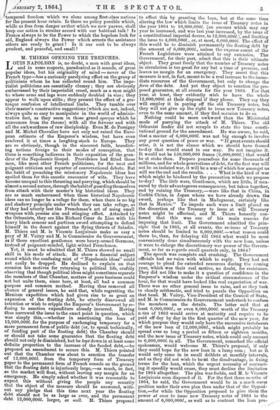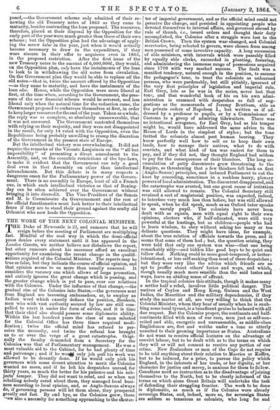If. TRIERS OPENING THE TRENCHES.
Yet, it must be admitted that M. Thiers showed no small skill in his mode of attack. He chose a financial subject round which the confusing mist of "Napoleonic ideas" could not easily be dropped. He declined to explain on that occasion his motives for returning to political life, craftily observing that though political ideas might sometimes separate the members of that Chamber, matters of pure business could not but unite them, since here, at least, all had a common purpose and common method. Having thus removed all chance of general issues, he said that, while regretting the Mexican expedition which had given rise to so great an expansion of the floating debt, he utterly disavowed all intention or wish to cripple the Emperor's Government by re- fusing to sanction expenditure already incurred. Having thus narrowed the issue to the exact point in question, which was simply this,—whether in sanctioning the loan of 12,000,0001. for the purpose of exchanging temporary for a more permanent form of public debt (or, to speak technically, of funding part of the floating debt) the Chamber should or should not take some guarantee that the floating debt should not only be diminished, but be kept down in at least some definite proportion to the increase of the funded debt,—he proposed an amendment to secure this. M. Thiers pointed out that the Chamber was about to sanction the transfer of 12,000,0001. from the temporary form of Treasury paper to the permanent form of French consols on the ground that the floating debt is injuriously large,—as much, in fact, as the market will float, without leaving any margin for an emergency. He simply asked whether it was reasonable to expect this without giving the people any security that the object of the measure should be answered, with- out any pledge that this time next year the floating debt should not be as large as ever, and the permanent debt 12,000,0001. larger, as well. M. Thiers proposed
to effect this by granting the loan, but at tho same time altering the law which limits the issue of Treasury notes in
the year 1864 to 10,000,0001. (an amount which may any year be iucreased, and was last year increased, by the issue of a constitutional imperial decree, to 12,000,0001.), and limiting the issue to 4,000,0001., or, at most, 6,000,0001. The effect of
this would be to diminish permanently the floating debt by the amount of 6,000,0001., unless the express assent of the
French Legislature were attained to any extension. The Government, for their part, admit that this is their ultimate object. They grant freely that the number of Treasury notes in circulation is too great for any but a time of pressure, and leaves no margin for an emergency. They assert that this measure is not, in fact, meant to be a real increase to the imme- diate resources of the Government, but only to change the form of the debt. And yet they object to sanction the pro- posed guarantee, at all events for the year 1864. For that year, at least, they evidently wish to have the whole 12,000,0001. at their disposal if they please. They say they will employ it in paying off the old Treasury notes, but they will not give up the right to issue new Treasury notes, even to the same amount, if they find occasion to do so.
Nothing could be more awkward than the Ministerial mode of parrying the attack of M. Thiers. The old Orleanist leader did not scruple to state the true consti- tutional ground for the amendment. He was aware, he said, that a matter of 6,000,0001. was not big enough to involve any great question of peace or war. " If great events should arise, it is not the clause which wo should have framed to-day that would stand in our way. Do not imagine it. It would not be 150,000,000 francs (6,000,000/.) that would be at stake then. Prepare yourselves for some thousands of millions, and for whole generations of debt, for the first war will not be an isolated war, it will be a war of which few amongst us will see the end and the results. . . . What is the kind of war which might be hindered by the precaution which we propose to-day? The little wars, Gentlemen, which are little, if mea- sured by their advantageous consequences, but taken together, end by ruining. the Treasury,—wars like that in China, in Cochin China, in Japan where we have already drawn the sword, perhaps like that in Madagascar, certainly like that in Mexico." To impede such wars a limit placed on the discretion of the Treasury to issue at • will Treasury notes might be effectual, and M. Thiers honestly con- fessed that this was one of his main reasons for imposing that limit. The Government admitted tho prin- ciple that in 1865, at all events, the re-issue of Treasury notes should be limited to 6,000,0001.—what reason could there be, then, for delaying till 1865 what would bo most conveniently done simultaneously with the new loan, unless it were to enlarge the discretionary war power of the Govern- ment, so far as regards small quarrels only, in 1864? The speech was complete and crushing. The Government officials had no voice with which to reply. They had not courage to plead for extended resources during the coming year, which was their real motive, no doubt, for resistance. They did not like to make it a question of confidence in the Emperor's wisdom under the critical circumstances of the hour, for that would have looked like real expectation of war. There was no other general issue to raise, and so they took to cloudy arithmetic, and tried to puzzle the Opposition on that head. M. Vuitry, Vice-President of the Council of State, and M. le Commissaire du Gouvernement undertook to confuse the members on the details. The latter said that at least 6,000,0001., or even 8,000,0001. worth of the Treasury totes of 1863 would arrive at maturity and require to be paid off day by day in the first quarter of the new year, for which purpose they would only have the successive instalments of the new loan of 12,000,0001., which might probably be spread over as long a period as fifteen or eighteen months, and the new issue of Treasury notes, which could only amount to 6,000,0001. in all. The Government, remarked the official spokesman, would welcome M. Thiers's proposal, if only they could hope for the new loan in a lump sum ; but as it would only come in in small driblets at monthly intervals, and as they did not wish to begat the disadvantage, in fixing terms for the loan, which the urgent necessity of contract- ing it speedily would cause, they must decline the limitation for 1864 altogether. The plea was feeble, and M. le Vicomte Lanjuinais soon disposed of it. For the first three months of 1864, he said, the Government would be in a much worse position under their own plan than under that of the Opposi- tion,—for while the Opposition proposed to give them the power at once to issue new Treasury notes of 1864 to the amount of 6,000,0001., as well as to contract the loan pro- posed,—the Government scheme only admitted of their re- newing the old Treasury notes of 1863 as they came to maturity, besides contracting the loan proposed. The resources, therefore, placed at their disposal by the Opposition for the early part of the year were much greater than those of their own scheme ; but the Opposition plan had the advantage of apply- ing the screw later in the year, just when it would actually become necessary to draw in the expenditure, if they were sincere in their offer to acquiesce even in 1865, in the proposed restriction. After the first issue of the new Treasury notes to the amount of 6,000,0001., they would, on the Opposition plan, only have the instalments of the loan to look to in withdrawing the old notes from circulation. On the Government plan they would be able to replace all the old notes—that is, twice the amount offered by the Opposition —as they came to maturity, and have the instalments of the loan also. Hence, while the Opposition were more liberal at first, at the time when, according to the Government, the pres- sure of the new financial scheme would be severest, and less liberal only when the natural time for the reduction came, the Government proposed to embarrass themselves at first, in order to keep larger resources for the end of the year. Taken as a whole, the reply was so complete, so absolutely unanswerable, that it was not answered. The Government contented themselves with relying on their majority, and they were not disappointed in the result, for only 14 voted with the Opposition, even the Republicans being probably unwilling to cramp the discretion of the Government in the present state of Europe.
But the intellectual victory was overwhelming. It did not require the remarks of the Vicomte Lanjuinais on the " all but impossibility" of presenting a direct amendment to the Assembly, and, on the eccentric restrictions of the bye-laws, to make it evident that the Government can rely a good deal even in that Assembly on other than intellectual intrenchments. But this debate is in many respects a dangerous omen for the Parliamentary power of the Govern- ment. There is no assembly in Europe, least of all a French one, in which such intellectual victories as that of Boxing- day can be often achieved over the Government without bringing it into discredit. The Vice-President of the Senate and M. le Commissaire du Gouvernement and the rest of the official functionaries must look better to their intellectual fence if they are to stand their ground against the crafty old Orleanist who now leads the Opposition. -

















































 Previous page
Previous page